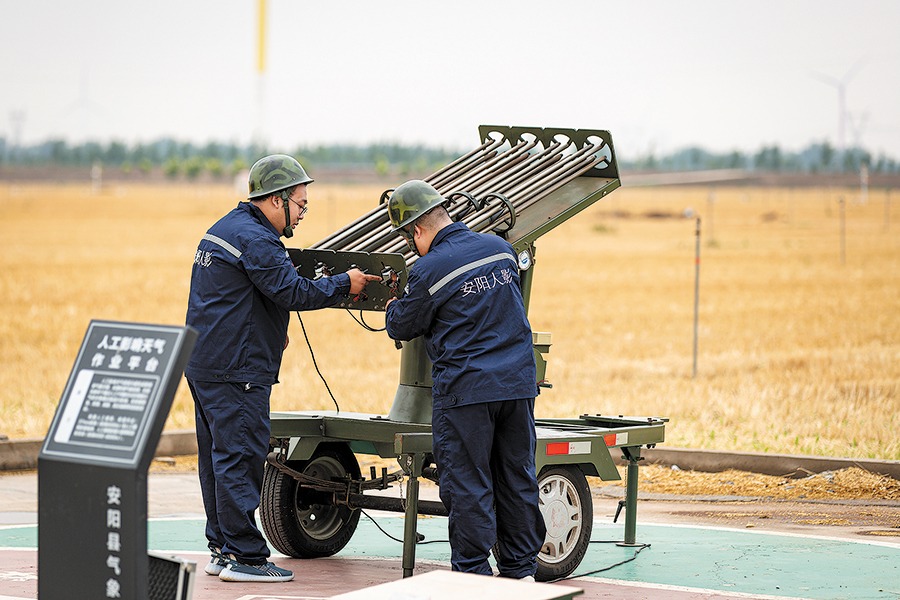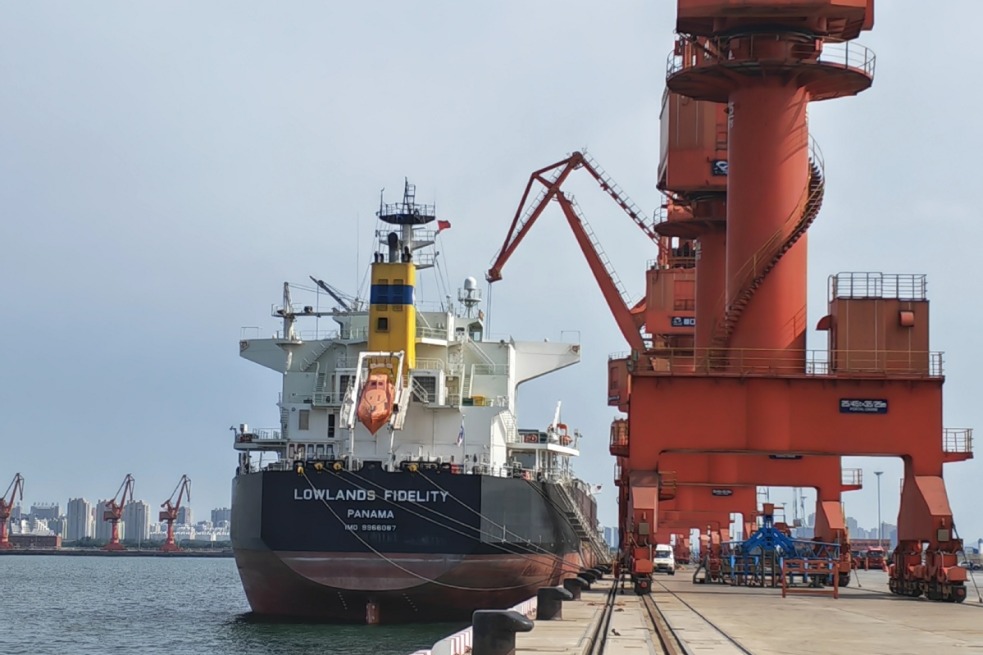Growing pains
It is imperative for China to establish an all-encompassing approach to secure its supply of key agricultural products


China's imports of certain key agricultural products, mainly driven by supply shortfalls, have continued to increase with rising domestic demand, greater market openness, and widening disparities in prices between domestic and international markets. This has led to an increasing dependence on the global supply. To balance development and security in a coordinative way while considering both domestic and international situations, it is imperative for China to strategize its agricultural supply security for the modernization journey ahead.
This entails adhering to an all-encompassing approach to food, resources, and agriculture, while deepening supply-side structural reforms in the agricultural sector.
First, it is important to establish a comprehensive support system to sustain the increase of agricultural production capacity. This includes implementing the strictest farmland protection system, bolstering the dynamic monitoring and evaluation of farmland quality, establishing incentive and constraint mechanisms, and enhancing the responsibility of relevant parties in protecting farmland quality. Furthermore, it is important to advance the construction of high-standard farmland, integrate investments across various departments, and promote soil improvement and ecological governance. The potential of arable land resources, coupled with the development of suitable machinery and cultivation techniques, should be further harnessed. It is important to embrace an all-encompassing approach to food, leverage technology to empower the synergized development of agricultural production and ecology, and explore new channels such as agroforestry, deep-sea aquaculture, desert agriculture, and plant factories for bolstering food supply. Additionally, the nation should establish an innovative seed sector and strengthen agricultural disaster-relief technologies and material reserves to enhance climate resilience in the agricultural sector.
Second, it is important to optimize agricultural subsidy policies to align with farmers' motivation for planting grain and the emphasis from local authorities on grain production. This involves supporting the establishment of a new type of unified management and cooperative operation system, promoting the integration of planting and breeding practices, extending processing chains, and diversifying functions. It also entails enhancing support for new-type agricultural business entities, regulating land transfer behaviors, and stabilizing long-term agricultural investment expectations. Meanwhile, it is also important to target agricultural subsidies in a more precise manner, improve crop insurance systems, increase subsidies for farm machinery, social service procurement, and agricultural inputs, and beef up support for green practices. We also need to strengthen support for major agricultural production areas and promote production-sales integration, while providing warehousing and transportation subsidies for important agricultural products.
Moreover, China must carry out a diversified import strategy to enhance the stability and reliability of its overseas supply chains.
First, the nation should stabilize and expand imports of agricultural products from North America and Oceania. The two regions, with superior agricultural resources and high-level modernization, represent an important source of China's key agricultural imports. Agricultural cooperation is also the ballast for trade and economic ties between China and countries in these regions, and thus heightened cooperation serves mutual economic interests.
Second, it is important for China to address weak links in its agricultural supply chains in South America, which serves as a primary source of the nation's agricultural imports. The region, with immense potential for future growth in agricultural production and exports, holds a crucial position in China's strategy for diversifying agricultural imports. Countries such as Brazil are highly dependent on imports for fertilizers and seeds. For instance, Brazil relies on the international market for 85 percent of its fertilizers, with nitrogen, phosphorus, and potassium fertilizers reaching dependency levels of 95.7 percent, 72 percent, and 96.4 percent, respectively. Looking ahead, to enhance the stability and reliability of China's agricultural supply chains in South America, it is essential to support relevant enterprises in establishing coordinated supply chains in the region. The nation should strengthen investment and trade cooperation across the entire agricultural industry chain with countries such as Brazil and Argentina, particularly in fertilizers and seeds.
Third, the Black Sea and Central Asia should be identified as key regions for diversifying agricultural imports. The Black Sea region, including Russia, and Central Asia, including Kazakhstan, still possess significant potential for agricultural production and trade growth. Chinese businesses should sign long-term agreements in conducting trade and investment cooperation within such regions. They should strive for more exemptions from export restrictions, make their terms of cooperation more specific and enforceable, and increase collaboration in areas such as seed industry and agricultural machinery. Meanwhile, countries in the region should be incentivized to cultivate more crops that are in massive demand in China.
Fourth, the agricultural investment and trade cooperation with countries in Southeast Asia and Africa must be elevated. Some countries in Southeast Asia and Africa possess favorable agricultural resources, with considerable potential for the production and export growth of edible oil plants, rice, maize, and other agricultural products. Agricultural cooperation with these countries can be prioritized within the framework of strategic partnerships, particularly under the Belt and Road Initiative. Through initiatives such as agricultural infrastructure construction and technical assistance, regional countries will be assisted to enhance the agricultural production capacity, so that they can export their agricultural produce after meeting the demand for domestic consumption. It is important to conduct thorough assessments of the natural ecology and cultural customs in these countries to mitigate potential risks in agricultural investment and trade cooperation.
In addition, the development of a unified and interconnected national agricultural product market should be advanced. This entails enhancing communication and joint research among various departments, improving the collection and analysis mechanism for market information across entire agricultural industry chains, and enhancing the ability to comprehensively utilize survey data and real-time big data. A unified system for the release of agricultural supply and demand information should be established. Meanwhile, it is imperative to improve the futures trading mechanisms to facilitate effective linkage between agricultural futures and spot markets. The development of rural cooperatives and the encouragement of collaboration between businesses and farmers must be promoted to assist small farmers in utilizing futures tools to mitigate market risks.
The nation should move forward with the alignment of its agricultural market system with international standards. While China is now among the top nations in terms of agricultural futures trading volume, its futures market still lags behind in terms of internationalization. The internationalization of China's agricultural futures market should be actively advanced by encouraging more foreign businesses to establish a presence in China and more Chinese businesses to go global, aligning trading varieties and rules with international standards, attracting the participation from more foreign enterprises and overseas investors. It is also important to encourage leading futures companies, asset management companies, and companies in the trading of spot products to engage in international market transactions through various means.


Ye Xingqing is the director of the rural economy research department at the Development Research Center of the State Council. Cheng Yu is deputy director of the rural economy research department at the Development Research Center of the State Council. The authors contributed this article to China Watch, a think tank powered by China Daily.
Contact the editor at editor@chinawatch.cn.

































